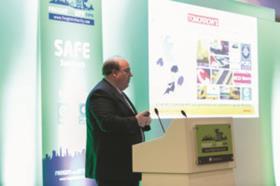When DHL Supply Chain launched its urban concept truck at Quiet Cities in November 2014, it was looking to take the first steps in helping to transform industry efforts to make city deliveries cleaner, safer and quieter.
Alongside the work of Clocs for the construction sector, DHL wanted to show the possibilities available for operators in using the right type of vehicle for urban work, with many manufacturers now rising to the challenge of designing safer city trucks.
The CNG-powered 2-axle rigid Scania P280 is designed to reduce emissions in built-up areas, provides higher visibility for the driver through an additional passenger door window in the low-entry cab, and has an array of 360-degree cameras.
It is also suited to handle out-of-hours deliveries thanks to a combination of: nylon components and pneumatic technologies on the roller shutter of the Don-Bur Teardrop trailer to reduce noise levels; a Noise Abatement Society (NAS) and PIEK-certified tail-lift run on a motor operating between 60dB(A) and 65dB(A); and a directed, tonal alarm – where the noise outside the hazard zone dissipates quickly – running at 5dB(A).
Demonstrating potential
Since its launch in late 2014, DHL has been using the truck as a demonstration vehicle in customers’ operations across London to show the possibilities available for urban deliveries. DHL now plans to use it across other cities in the UK, with Manchester next on the list.
“What’s been impressive for customers and residents is the quietness of the vehicle, and that it is very low. Safe and quiet is the strapline of the vehicle, and it does what it says on the tin. We’ve had a number of enquiries off the back of it being used in trials,” said Phil Roe, DHL Supply Chain MD Transport UK and Ireland (pictured at Freight in the City Expo 2015

).
He told Freightinthecity that DHL is looking to add more to its fleet on a customer-by-customer basis.
Part of the trial has included working with manufacturers to help drive down the cost of the concept truck and ensure DHL can get a “good economic business case” for the vehicle. Roe said that tackling the cost challenge is important for all operators exploring new technology and vehicle design, and is key to driving wide-scale adoption of such vehicles.
“When we launched the vehicle at Quiet Cities, there were hardly any urban vehicles created to show what was possible,” he said.
“If you go to the Clocs show, and look in trade publications, lots of people are following that lead. Now low cabs, quiet vehicles and alternative fuels are becoming more prevalent in the wider economy and I’m proud to say we were right at the start of this,” said Roe.
Keep the noise down
He added the concept truck has significantly raised the profile of quiet out-of-hours deliveries, as did the technology and innovation award DHL Supply Chain received last year from the Noise Abatement Society.
Following on from its work on the TfL-led quiet delivery trials during the London 2012 Olympics, DHL continued to develop this side of its operations with customers on an individual basis. “It’s always a case-by-case process for doing out-of-hours deliveries,” said Roe. “It is largely driven by the lack of an accepted quiet standard that would speed up the adoption of out-of-hours deliveries.”
DHL has been working closely with the NAS to help urban businesses understand the benefits for all stakeholders associated with out-of-hours deliveries. For example, the collaboration has seen them visit a large retail store in south London, as well as a retailer located on Charing Cross Road and demonstrate a balanced approach towards considering all parties involved in out-of-hours deliveries.
Roe wants to see the method developed into an accepted standard that could be incorporated into some existing urban schemes to help drive wider adoption of out-of-hours deliveries.
“Businesses would see there is an easier way of doing it. At the moment they see it as quite a long and arduous process. Getting a standard the same as Clocs, a quiet standard that is adopted and accepted in urban areas, is probably the most important part of moving this agenda forward,” he said.
Don't reinvent the wheel
Devolution of UK cities is a positive move allowing local areas to reflect their individual needs, believes Roe.
However, he urges city councils to not introduce more urban compliance standards for the freight sector, which might result in unintended consequences for operators.
“We’ve got some great standards and schemes out there and we don’t need to reinvent them. If we do, the industry might say ‘hang on a minute, I’m not quite sure which one I should be following’. I think collaboration is the key,” he added.













